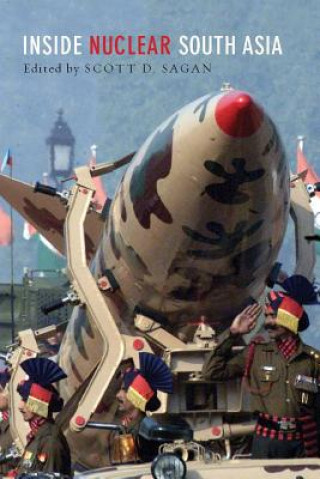
Kód: 04718705
Inside Nuclear South Asia
Autor Scott D. Sagan
Nuclear-armed adversaries India and Pakistan have fought three wars since their creation as sovereign states in 1947. They went to the brink of a fourth in 2001 following an attack on the Indian parliament, which the Indian govern ... celý popis
- Jazyk:
 Angličtina
Angličtina - Vazba: Brožovaná
- Počet stran: 296
Nakladatelství: Stanford University Press, 2009
- Více informací o knize

746 Kč

Skladem u dodavatele v malém množství
Odesíláme za 9-13 dnů
Potřebujete více kusů?Máte-li zájem o více kusů, prověřte, prosím, nejprve dostupnost titulu na naši zákaznické podpoře.
Přidat mezi přání
Mohlo by se vám také líbit
-

Interactive Level 3 Class Audio CDs (3)
1814 Kč -

Music Learning Today
1614 Kč -

Everything You Need to Know About Building the Custom Home
402 Kč -

Manage to Win
938 Kč -

Naked Germany
1579 Kč -

The Only Game
898 Kč -

GLACIERS ARE MELTING
345 Kč
Dárkový poukaz: Radost zaručena
- Darujte poukaz v libovolné hodnotě a my se postaráme o zbytek.
- Poukaz se vztahuje na celou naši nabídku.
- Elektronický poukaz vytisknete z e-mailu a můžete ihned darovat.
- Platnost poukazu je 12 měsíců od data vystavení.
Více informací o knize Inside Nuclear South Asia
Nákupem získáte 75 bodů
 Anotace knihy
Anotace knihy
Nuclear-armed adversaries India and Pakistan have fought three wars since their creation as sovereign states in 1947. They went to the brink of a fourth in 2001 following an attack on the Indian parliament, which the Indian government blamed on the Pakistan-backed Lashkar-e-Taiba and Jaish-e-Mohammed terrorist organizations. Despite some attempts at rapprochement in the intervening years, a new standoff between the two countries was precipitated when India accused Lashkar-e-Taiba of being behind the Mumbai attacks late last year. The relentlessness of the confrontations between these two nations makes Inside Nuclear South Asia a must read for anyone wishing to gain a thorough understanding of the spread of nuclear weapons in South Asia and the potential consequences of nuclear proliferation on the subcontinent. The book begins with an analysis of the factors that led to India's decision to cross the nuclear threshold in 1998, with Pakistan close behind: factors such as the broad political support for a nuclear weapons program within India's ruling Bharatiya Janata Party (BJP), the intense rivalry between the two countries, the normative and prestige factors that influenced their behaviors, and ultimately the perceived threat to their respective national security. The second half of the book analyzes the consequences of nuclear proliferation on the subcontinent. These chapters show that the presence of nuclear weapons in South Asia has increased the frequency and propensity of low-level violence, further destabilizing the region. Additionally, nuclear weapons in India and Pakistan have led to serious political changes that also challenge the ability of the two states to produce stable nuclear detente. Thus, this book provides both new insights into the domestic politics behind specific nuclear policy choices in South Asia, a critique of narrow realist views of nuclear proliferation, and the dangers of nuclear proliferation in South Asia.
 Parametry knihy
Parametry knihy
Zařazení knihy Knihy v angličtině Humanities History Regional & national history
746 Kč
- Plný název: Inside Nuclear South Asia
- Autor: Scott D. Sagan
- Jazyk:
 Angličtina
Angličtina - Vazba: Brožovaná
- Počet stran: 296
- EAN: 9780804762397
- ISBN: 0804762392
- ID: 04718705
- Nakladatelství: Stanford University Press
- Hmotnost: 456 g
- Rozměry: 153 × 228 × 22 mm
- Datum vydání: 17. August 2009
Oblíbené z jiného soudku
-

Hundred Years' War on Palestine
330 Kč -

Ethnic Cleansing of Palestine
358 Kč -

History of Japan
405 Kč -

Ten Myths About Israel
336 Kč -

Strange Death of Europe
410 Kč -

Decline and Fall of the Roman Empire
130 Kč -

Secret History
320 Kč -

God's Playground A History of Poland
1700 Kč -

Mayflower
385 Kč -

How to be a Victorian
357 Kč -

Plantagenets
331 Kč -

General's Son
428 Kč -

Iran: A Very Short Introduction
269 Kč -

Temples of Karnak
3800 Kč -

Twenty Years A-Growing
249 Kč -

Cuneiform
358 Kč -

History of Witchcraft in England from 1558 to 1718
453 Kč -

China in Africa
894 Kč -

Islandman
275 Kč -

Bohemian Paris
414 Kč -

Alexiad
423 Kč -

Lancaster And York
490 Kč -

Modern France: A Very Short Introduction
269 Kč -

Inside Hitler's Greece
522 Kč -

Diana: Her True Story - In Her Own Words
306 Kč -

The Fourth Turning
441 Kč -

The Oxford History of Ancient Egypt
418 Kč -

Churchill: The Power of Words
410 Kč -

Palestine
534 Kč -

Korean History in Maps
706 Kč -

Great Gatsby (Wisehouse Classics Edition)
405 Kč -

Viking Way
1144 Kč -

The Thirteenth Tribe
308 Kč -

My Promised Land
358 Kč -

Vanished Kingdoms
514 Kč -

Age Of Revolution
410 Kč -

Life and Death of Anne Boleyn
624 Kč -

Coming of the Third Reich
464 Kč -

Children of Ash and Elm
464 Kč -

Europe Between the Oceans
798 Kč -

Socialism Betrayed
475 Kč -

303 Squadron
452 Kč -

Ancient Celts, Second Edition
623 Kč -

Dancing in the Glory of Monsters
395 Kč -

Battle of Britain: Luftwaffe Blitz (Images of War)
606 Kč -

Age of Confucian Rule
851 Kč -

Beyond Band of Brothers
410 Kč -

Benjamin Franklin
410 Kč -

On China
462 Kč
Osobní odběr Praha, Brno a 12903 dalších
Copyright ©2008-24 nejlevnejsi-knihy.cz Všechna práva vyhrazenaSoukromíCookies


 Vrácení do měsíce
Vrácení do měsíce 571 999 099 (8-15.30h)
571 999 099 (8-15.30h)